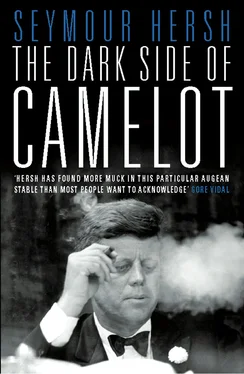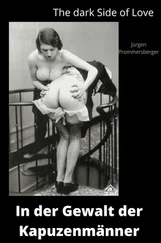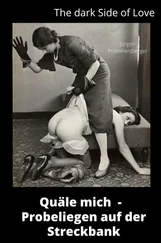Kennedy was equally unprincipled in his use of ambassadorial perquisites. Klemmer told Whitehead that one of his principal duties at the embassy was shipping Kennedy’s liquor. “Using his name and the prestige of the embassy and also my connection with the Maritime Commission, I was able to get shipping space for up to, I think, around 200,000 cases of whiskey at a time when shipping space [from England to the United States] was very scarce.” Kennedy’s abuse of office on behalf of Somerset Importers was so extreme, Klemmer said, that “a British friend in the Ministry of Shipping came to see me one day and said, ‘You’d better lay off with the ambassador’s whiskey, because some of the other distillers, who can’t get shipping space, are going to have the question raised in Parliament. He’s using the influence of the American Embassy to preempt shipping space.’ So,” Klemmer concluded, “we kind of tapered off a little bit after that.” Kennedy ignored the widespread gossip about his whiskey dealing, Klemmer added: “He just brushed it off.… His stock reply to any criticism was ‘To hell with them.’… He didn’t take things like that seriously.”
London’s concerns about the American ambassador went far beyond defeatism and profiteering. British policy, after the failure of Prime Minister Neville Chamberlain’s appeasement of Hitler at Munich, was unstated but nonetheless clear: to somehow get the United States into the war against Germany. In May 1940, with France on the verge of defeat, Winston Churchill, who had been serving as first lord of the Admiralty, replaced the failed Chamberlain. A few days later, while shaving, Churchill announced to his son, Randolph: “I think I can see my way through.” Randolph, recalling the conversation in a 1963 memoir, asked, “Do you mean we can avoid defeat or defeat the bastards?” His father, flinging his razor into a washbasin, proclaimed, “Of course I mean we can beat them.” Asked how, the new prime minister simply said, “I shall drag the United States in.”
It was clear even before Churchill became prime minister that Joe Kennedy, with his access to Roosevelt, his desire to meet personally with Adolf Hitler, and his eagerness to avoid American involvement in the war at all costs, had become a national security risk to England. Historians are in agreement that Kennedy was a priority target of Britain’s famed MI5, its counterintelligence service, and was subjected to physical surveillance as well as extensive wiretapping. No such files have been declassified and released by the British government, despite repeated requests.
Harvey Klemmer knew firsthand, though, about MI5’s close surveillance. Kennedy was seeing a wealthy English divorcée who was in touch with Sir Oswald Mosley, a leading British fascist. The woman, Klemmer said in his interview, “told me that Joe had asked her to initiate … contact with Mosley,” in the mistaken belief that the fascists in England were more numerous than they were. “So one day [Kennedy] asked me to take her home and it was in one of her cars. So I did. And on the way back I was stopped by a man in uniform who said there was an air raid or invasion drill in progress. I would have to leave my car for a while and take refuge with them in a nearby country home.… I wondered if there was something going on, and so I arranged my gloves on the seat in a certain way, and I arranged some of the papers in the glove compartment.” After an hour, when Klemmer was given the all-clear sign, “I looked and I could see the car had been searched.… I knew I was under suspicion” by British intelligence, Klemmer said, “because of my association with him. My files at the embassy were searched,” as was, he believed, his London apartment. He and others at the embassy did learn later, Klemmer told Whitehead, that “the British had Kennedy’s telephone tapped.”
Given his precarious position in London, some of Kennedy’s actions seem stupefying.
In the spring of 1939, shortly after Germany’s occupation of Czechoslovakia, Kennedy—despite being instructed not to do so by Washington—encouraged a bizarre and little-known scheme being actively promoted by a naive American automobile executive who had been told in Berlin that the Nazi regime would agree to peace concessions and a general disarmament in return for an Anglo-American gold loan totaling between $500 million and $1 billion. The American, James D. Mooney, president of General Motors Overseas, flew to London to discuss the German proposal with an equally impressed Kennedy at the American Embassy. According to Mooney’s unpublished memoir, made available for this book, Kennedy urged Mooney to return to Berlin and inform the Germans that he would “certainly like to have a talk with them, quietly and privately.” Mooney’s papers reveal that it was agreed that Kennedy would meet secretly in Paris with Dr. Helmut Wohltat, a high-level Nazi official who was a deputy to Field Marshal Hermann Göring. Only after Kennedy made the commitment to Mooney did he send a vaguely worded cable to the State Department, wondering whether there would be “any objections” to his flying to Paris to meet with Mooney and “a personal friend of Hitler.” He was emphatically denied permission to make the trip by Secretary of State Cordell Hull. Mooney, still eager to involve Kennedy, returned to London and presented the ambassador with the list of the promised German concessions that would result from the gold loan. “What a wonderful speech could be built up from these points back home!” Kennedy exclaimed, according to Mooney’s notes. Kennedy then took his case for a meeting directly to President Roosevelt, and was told once again to have nothing to do with the proposal.
Nonetheless, Kennedy met in secret with Mooney and Wohltat at a hotel in London on May 9, 1939. “Each man made an excellent impression on the other,” Mooney recorded in his unpublished memoir. “It was heartening to sit there and witness the exertion of real effort to reach something constructive.” Within days, London’s Daily Express blew everyone’s cover by reporting on its front page, under the headline “Goering’s Mystery Man Is Here,” that Wohltat had arrived in London “on a special mission.” Neither Kennedy nor Mooney was named in the article, but a few days later Kennedy was singled out for censure in The Week , a radical weekly newsletter. Its editor, Claud Cockburn, wrote that Kennedy, in his talks with Germans, “uses language which is not merely defeatist, but anti-Rooseveltian.… Mr. Kennedy goes so far as to insinuate that the democratic policy of the United States is a Jewish production, but that Roosevelt will fall in 1940.” The article was reprinted in the New York Post and eventually brought to Roosevelt’s attention by Harold Ickes. In his diaries, Ickes noted that “the President read this and said to me: ‘It is true.’”
Kennedy’s indiscretion knew no limits. After Munich he had summoned a group of American journalists to the embassy and, among other things, briefed them off the record about a most secret plot by a group of dissident German generals to overthrow Hitler. James Reston of the New York Times summarized the briefing in Deadline , his 1991 memoir: “It was known in London on the eve of Munich that … a group of German officers led by Generals Halder and Beck had a plan to overthrow the Führer. Fearing war on three fronts, these conspirators informed officials in Westminster [the British Foreign Office]—so Ambassador Kennedy told us—that they would arrest Hitler if the British and French took military action to block the invasion of Czechoslovakia.” It would not become publicly known until after the war that the plotters, General Ludwig Beck, then chief of the German General Staff, and his deputy, Franz Halder—their lives very much at stake—had approached the British Foreign Ministry. The Beck-Halder partnership was the most serious early resistance to Hitler and also involved, by some accounts, a plan to assassinate Hitler. *
Читать дальше












